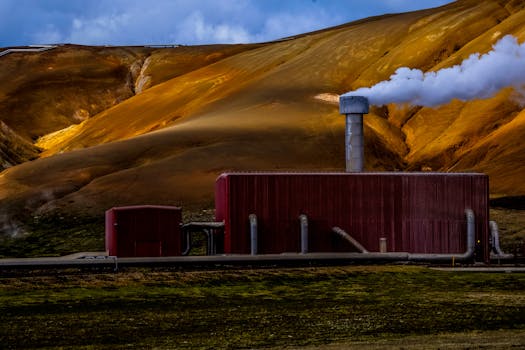happpy.news is an open source project, made with ♥ by reuben armstrong
and powered by this advert ^ from charity.marketing
Kenya is tapping into its vast geothermal power reserves to boost renewable energy generation, reducing reliance on fossil fuels and contributing to a cleaner environment.

Kenya is making significant strides in its commitment to renewable energy by leveraging its abundant geothermal resources. With a vast network of geothermal power plants, the country is poised to reduce its reliance on fossil fuels while contributing to a cleaner and more sustainable environment. This initiative not only enhances energy security but also positions Kenya as a leader in renewable energy in Africa.
Geothermal energy is derived from the Earth's internal heat, and Kenya is fortunate to sit atop the East African Rift, which provides a rich source of geothermal resources. According to the Geothermal Development Company, Kenya has an estimated potential of about 10,000 megawatts of geothermal energy, making it one of the top countries in the world for geothermal production. Currently, the country generates approximately 1,000 megawatts of electricity from geothermal sources, which accounts for around 45% of its total electricity production.
The government's commitment to increasing geothermal power generation is evident in its various initiatives and partnerships aimed at expanding this clean energy source. The Kenya Electricity Generating Company (KenGen) has been at the forefront of these efforts, successfully developing several geothermal projects in the Olkaria region. These projects not only produce electricity but also create job opportunities and stimulate local economies.
In addition to reducing greenhouse gas emissions, harnessing geothermal energy helps stabilize electricity prices in Kenya. The fluctuating costs associated with fossil fuels can significantly impact energy prices, whereas geothermal energy provides a more stable and predictable cost structure. By investing in renewable energy technologies such as geothermal, Kenya is working towards energy independence and security.
Furthermore, the use of geothermal power is essential for community development. Access to reliable and affordable electricity enables better education, healthcare, and economic opportunities for citizens. For instance, rural communities that previously relied on kerosene lamps for lighting are now able to access clean energy, improving their quality of life and promoting sustainable development.
The impact of Kenya’s geothermal initiatives extends beyond its borders. As a pioneer in geothermal energy production, Kenya serves as a model for other African nations looking to transition to renewable energy. The country's experience in geothermal development can provide valuable insights and guidance for neighboring countries aiming to tap into their own geothermal potential.
Moreover, the global demand for renewable energy sources is on the rise, and Kenya's advancements in geothermal technology are attracting international investments. Partnerships with global entities and stakeholders have the potential to further enhance Kenya's geothermal capacity, fostering innovation and technological advancements in the sector.
As Kenya continues to harness its geothermal resources, the future looks promising. The nation is on track to achieve its Vision 2030 goals, which include increasing access to electricity and enhancing the share of renewable energy in its energy mix. By prioritizing sustainable energy solutions, Kenya is not only addressing its energy challenges but also contributing to global efforts to combat climate change.
In conclusion, Kenya's commitment to harnessing geothermal power is a significant step towards a sustainable energy future. By reducing reliance on fossil fuels and boosting renewable energy generation, the country is setting a positive example for others to follow. With continued investment and innovation, Kenya stands to lead the way in the renewable energy revolution, benefiting both its citizens and the planet.
Source: Reuters